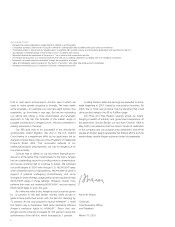Amgen 2000 Annual Report Download - page 16
Download and view the complete annual report
Please find page 16 of the 2000 Amgen annual report below. You can navigate through the pages in the report by either clicking on the pages listed below, or by using the keyword search tool below to find specific information within the annual report.
18
RHEUMATOID ARTHRITIS
More than 6 million people worldwide have rheumatoid
arthritis (RA), a systemic disease that commonly involves
inflammation of small joints with bone and cartilage destruc-
tion. This course of the disease eventually may lead to disability
and decreased life expectancy.
In RA, the inflamed joint lining may invade and damage
bone and cartilage, while inflammatory proteins stimulate the
release of enzymes that actually digest bone and cartilage.
This results in loss of shape and alignment of the joint, pain,
and reduced mobility. X-rays of patients with rheumatoid
arthritis show that the most rapid deterioration of joint function
often occurs within the first few years of the disease, leaving a
small window of opportunity for intervention before irreversible
damage may occur.
Though joint erosion can begin early in RA, more than half
the people with this debilitating disease are undiagnosed or
not seeking treatment. While there is no cure for this disease,
doctors traditionally have used drugs originally developed for
use in other therapeutic areas—such as cancer treatment and
organ transplantation —to reduce swelling, alleviate pain and
stiffness, and preserve joint function for patients with RA. Still,
there remains a clear unmet medical need. Many doctors say
that now is a promising time to be treating patients with RA
given the potential of new biological therapies. Nonetheless,
fewer than 10 percent of patients with RA receive these newer
drugs, and many may suffer the progression of RA.
Cytokines are proteins that deliver chemical messages
among cells. Cytokines activate immune responses to fight off
infections and decrease tissue injury and cell death. But in
patients with RA, there is persistent activation of the immune
system, which leads to an overabundance of certain cytokines
that induce structural damage and inflammation. The two key
cytokines in RA are Interleukin-1 (IL-1) and Tumor Necrosis
Factor-alpha (TNF-α). These two cytokines act together to
induce production of other cytokines and enzymes that cause
much of RA’s pain, swelling, and destruction. Preclinical stud-
ies have demonstrated that IL-1 plays the dominant role in
bone and cartilage destruction. Additionally, clinical evidence
has shown that patients with bone erosion have higher levels
of IL-1 in their joints. Amgen has two potential candidates in
development to block each of these cytokines.
Anakinra, a recombinant form of naturally-occurring IL-1
receptor antagonist (IL-1ra, a protein the body produces to reg-
ulate IL-1) is the most advanced product candidate. Clinical
studies suggest that by binding to IL-1 receptors, anakinra
appears to interfere with the action of excess IL-1 and may help
regulate the inflammatory imbalance between IL-1 and IL-1ra.
Clinical trials suggest that anakinra may reduce the progres-
sion of joint destruction in patients with RA. Long-term studies
also suggest that patients who continue on anakinra for longer
periods may have a further slowing in the rate of disease pro-
gression. Amgen has submitted regulatory files for the
approval of anakinra for the treatment of rheumatoid arthritis
patients around the world.
Amgen’s second product candidate for RA, soluble TNF-
receptor type I (sTNF-RI), is in early studies to assess its
effectiveness in blocking the impact of TNF-αin patients with
RA. Another clinical trial is evaluating the effectiveness of
anakinra and sTNF-RI together in treating patients with RA.
Amgen is committed to advancing the science of rheuma-
tology and hopes to soon offer an important new treatment to
improve the lives of people affected by the serious and debili-
tating disease of rheumatoid arthritis.
























